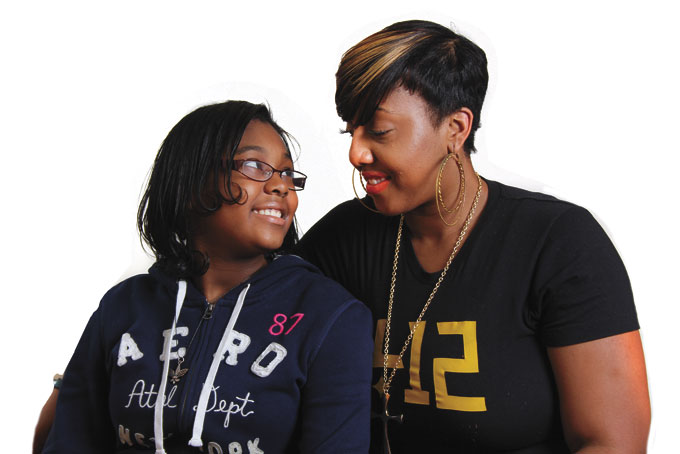
A HELPING HAND—Briana Snyder, a student at Pittsburgh Sterrett and participant in the United Way of Allegheny County’s “Be a Middle School Mentor” program, with mentor Mercedes Howze. (Photo courtesy of Blender Inc.)
With school in session this week for students in the Pittsburgh Public Schools and surrounding districts, students will have to transition from summer break mode to back-to-school mode. While students in all grades will be making some form of transition, it is even harder for those entering middle school. Most middle school students will be coming from a familiar elementary school to a new middle school, or facing tougher educational lessons or even encountering new peer pressures.
In an effort to reach more students, and to make their transitions easier and keep them on the path to success, the United Way, in conjunction with the Youth Futures Commission and the Mentoring Partnership of Southwest Pennsylvania, has expanded their Be a Middle School Mentor program, formerly known as the Be a 6th Grade Mentor program, to reach students in grades beyond 6th and in more schools.
“From the Pittsburgh Public School, other districts and research, we’ve heard the middle school (years) are pivotal times for young people,” said Damon Bethea, director of Mentoring Projects for the United Way Allegheny County. “Although there are many phases of transition in one’s life, middle school is the most significant transition (for young people) and there is a lot going on with young people during this time.”
Many say middle school is the most crucial time in a young person’s life because it is when development begins. According to Bethea, research says that about 60 percent of youth begin to lose interest in education between elementary school and high school.
By mentors committing one hour a week to their mentees, Bethea said Be a Middle School Mentor: helps students with the transition from elementary school to middle school and ultimately from middle school to high school; helps them to set career goals; gets them ready for the Pittsburgh Promise secondary education scholarship; helps them address peer pressure, and lets them know that there is a caring adult there for them.
The mentoring program, which was first launched in 2009, began by only focusing on 6th grade students, but after a need and a want to reach more youth, Bethea said the program decided to expand its reach. In its inception, the program matched 225 sixth grade students with mentors, last year 305 and this year, for the 2013-2014 school year, he said the program projects to match approximately 450 students.
Their goal is more attainable because this year, Be a Middle School Mentor will be in 12 Pittsburgh Public Schools: Allegheny Traditional Academy, Arsenal Elementary School, Pittsburgh Classical Academy, Martin Luther King Jr. Elementary, Schiller Classical Academy, South Hills Middle School, Pittsburgh Sterrett, and Pittsburgh South Brook, with Pittsburgh Manchester, Pittsburgh Milliones/University Prep, Pittsburgh Obama Academy and Pittsburgh Westinghouse being added this year.
Mercedes Howze, a mentor at Pittsburgh Sterrett through the Mt. Ararat Community Activity Center and a Pittsburgh Public Schools employee, said she participates in the program because she feels it’s her duty to make a commitment beyond the classroom and finds it’s a good way to attract and retain families in the district.
She also said, mentoring “provides that additional guidance that many need, not only academically and socially, but mentally, physically and emotionally.”
According to a release by the United Way, the University of Pittsburgh’s Learning Research and Development Center recently conducted a study evaluating the first two years of the program and found that youth participating in the program made gains in eligibility for the Pittsburgh Promise among the criteria of attendance and GPA. The study reported that prior to participating in the mentoring program, 34 percent of program youth and 51 percent of comparison youth had GPA’s that qualified them for the Pittsburgh Promise. At the end of the program, the numbers increased to 57 and 55 percent respectively.
With the program’s growing success, Bethea said there is a need for more volunteers, especially African-American volunteers. He said last year 77 percent of its program’s mentees were African-Americans and only 15-20 percent of its mentors were African-American.
“Of course we would love to have more. We are working closer with the Urban League (of Greater Pittsburgh) to attain more Black mentors,” he said. “There are many in our community that talk about the plight of young people and where they are going. This (mentoring) is one avenue where adults can volunteer to plant a seed to encourage them to stay on the right path, and also be an example and model of how you can be a success and the importance of education.”
Along with the Urban League, organizations such as Big Brothers and Big Sisters of Greater Pittsburgh, Communities in Schools, and Mt. Ararat Community Activity Center also partner with Be a Middle School Mentor to bring mentees and mentors together for a lasting relationship.
As for the program’s future, Bethea said they will continue to work with Pittsburgh Public Schools and the students to do whatever they can to have a positive effect on their education and in their lives.
For more information on Be a Middle School Mentor, visit www.beamiddleschoolmentor.org.
Your comments are welcome.
Follow @NewPghCourier on Twitter https://twitter.com/NewPghCourier
Like us at https://www.facebook.com/pages/New-Pittsburgh-Courier/143866755628836?ref=hl
Download our mobile app at https://www.appshopper.com/news/new-pittsburgh-courier